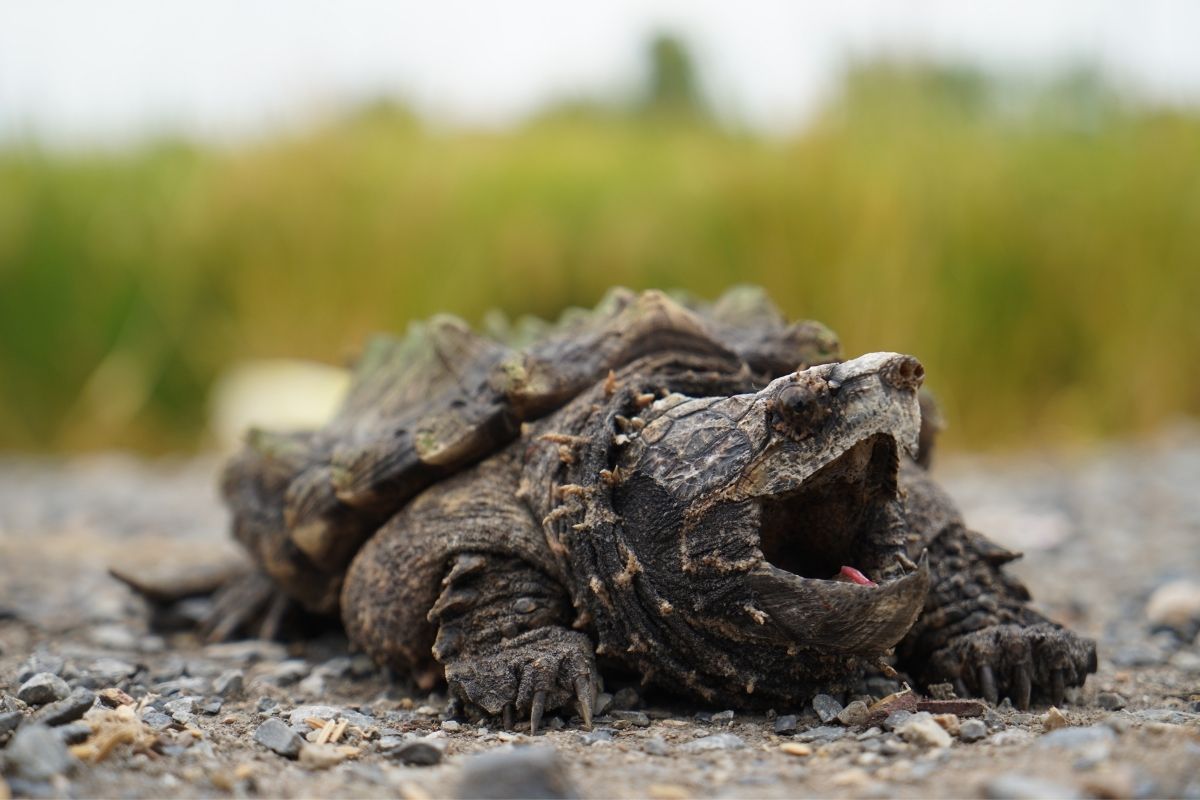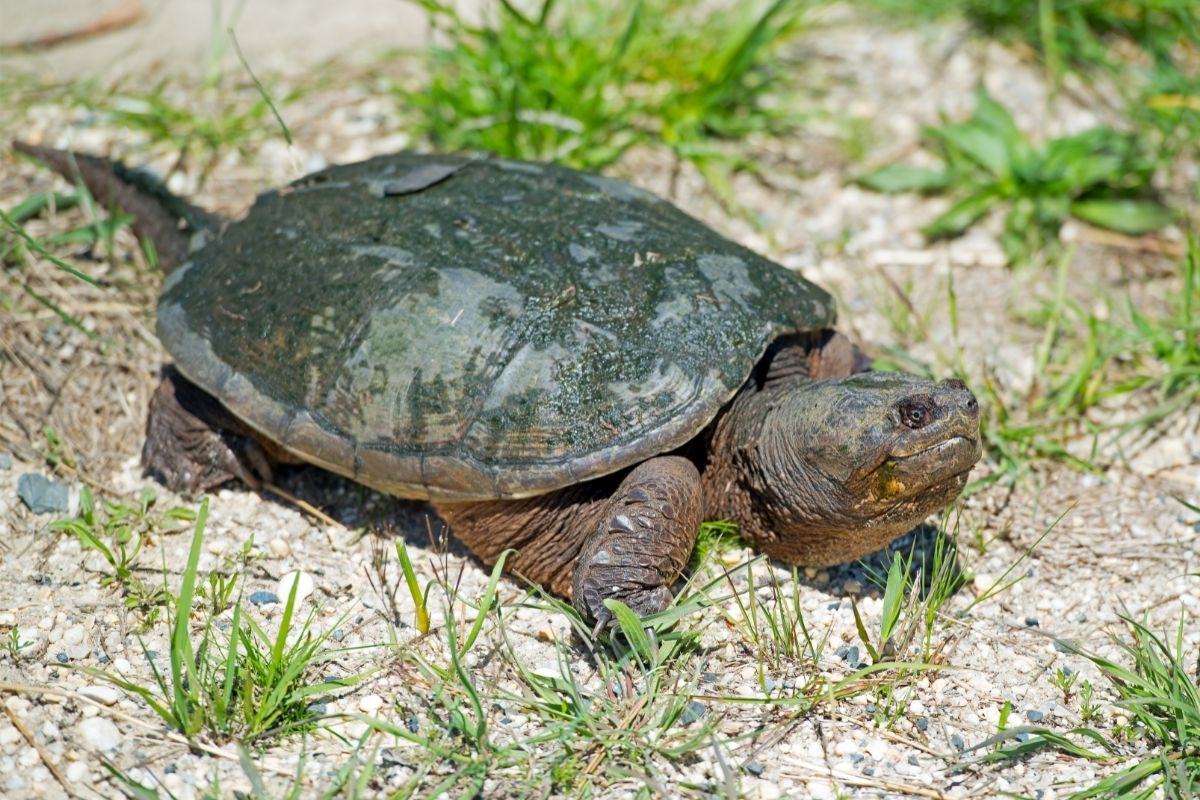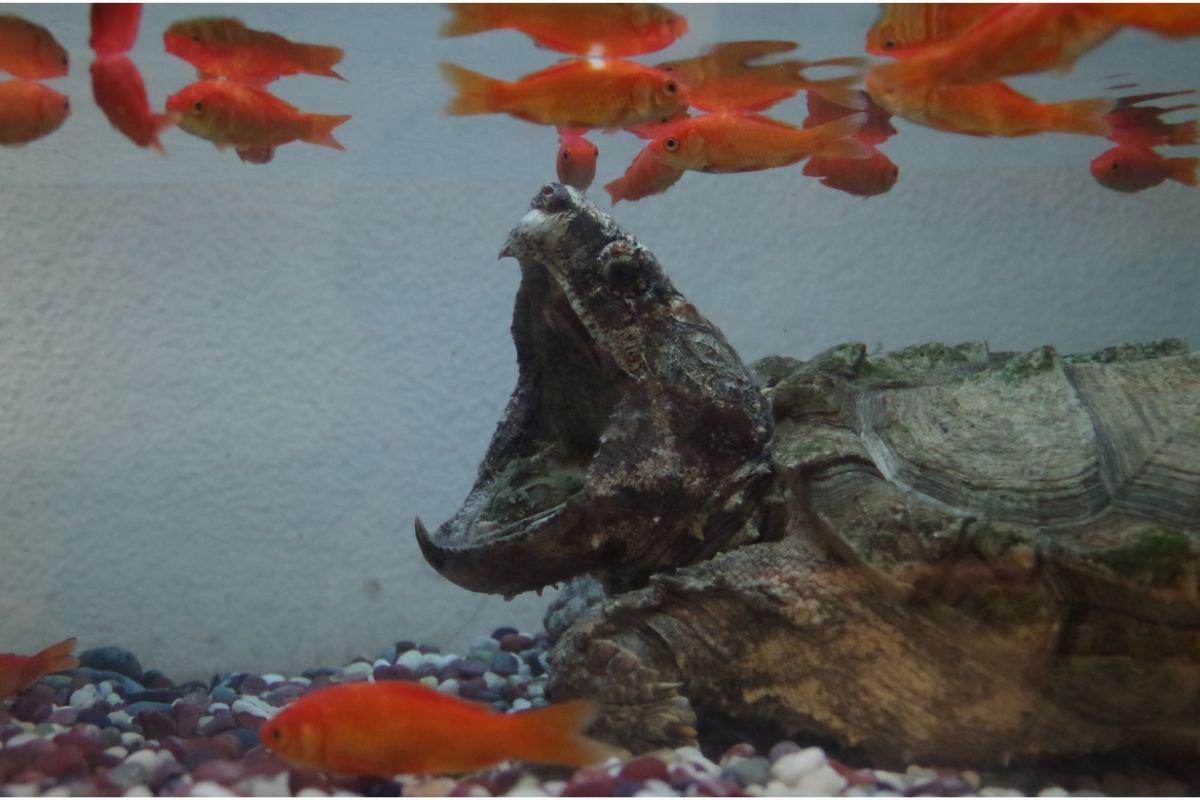Snapping turtles are known for being very good hunters, and also have the reputation of being aggressive.

If you’re wondering whether snapping turtles eat ducks, you’re in the right place.
In this article, I will discuss some key information about a snapping turtle’s diet, including whether snapping turtles eat ducks.
So, let’s get into it.
The snapping turtle is a large, predatory reptile that can grow up to 5 feet long. It has a very distinctive appearance and is known for its highly powerful jaws that are no match for much of its prey.
They are often mistaken for alligators or crocodiles in the water as when they snap their prey, they do so from above. They use their powerful jaws to bite off chunks of flesh from their prey.
Their diet consists mainly of fish, amphibians, birds, but they will eat pretty much anything that they come across as I go into below.
Do Snapping Turtles Eat Ducks?
Snapping turtles are members of the family Chelydridae. They are opportunistic predators and will take whatever food is available, which includes ducks!

So, yes, snapping turtles eat ducks if given the opportunity to do so.
Snapping turtles are omnivores. They feed mainly on fish, frogs, insects, birds, mammals, and invertebrates.
However, if they were near a duck, they would easily kill and eat ducklings and attack larger ducks, too.
Younger snapping turtles will forage for food. However, their older counterparts can often be seen hanging motionless in the water and ambushing their prey by lunging forward with their powerful jaws to seize their prey.
The diet of snapping turtles varies depending on their age and sex. Adult females usually eat more aquatic animals than adult males do.
In addition, juvenile male snapping turtles eat more terrestrial animals like small reptiles, amphibians, and insects than female turtles do.
Snapping Turtles & Ducks
A snapping turtle is certainly large enough to attack ducks as well as eat ducks if they happen to stumble across them.
Generally speaking, a snapping turtle will primarily opt to hunt ducklings that are yet to reach the flying stage.
A turtle on land is slow, but its speed quadruples in water making it much more likely to hunt down ducks and fish quite easily.
When hunting, a snapping turtle will swim slowly towards its prey. It then stops at an optimal distance from the prey before striking.
The turtle will then lunge forward and grab its prey using its strong jaw.
However, if the prey is too big or too heavy to carry back to shore, the snapping turtle will instead swallow its prey whole.
Some aquatic species even have the ability to use their tongues as bait.
This cunning technique allows them to lure small fish or other aquatic creatures into their mouths, allowing the snapping turtle to close their jaws around them before swallowing them.
Duck Hunting
Adult snapping turtles typically walk along the bottom of the stream or lake when hunting for food.
While younger snapping turtles actively seek out their prey, older snapping turtles tend to have more patience.
Adult snapping turtles are not afraid of swimming close to the surface where ducks may be resting. If they see a duck, they will quickly approach it and try to catch it.
An unsuspecting duck that is sitting on the surface of the water, therefore, makes the perfect snack for a snapping turtle nearby waiting to strike at them.
This shows how dangerous these turtles can be.
Adult snapping turtles are able to dive deep underwater to capture their prey. If a duck happens to fall into the water while trying to escape from a snapping turtle, the turtle will immediately go after it.
Once the duck has been caught, the turtle will either drag it along the bottom of the water or pull it up onto the surface. If the duck struggles against the turtle.
How Do Snapping Turtles Eat?
Adult snapping turtles tend to hunt with the ambush method to catch their prey. When they spot a potential meal, they will swim slowly towards it until they are within striking range.

As soon as the turtle strikes, it grabs hold of its prey and swallows it whole.
If the prey is too big, the turtle will simply swallow it whole without chewing it first. If the prey is smaller than what the turtle needs, it will bite off pieces of the prey and then swallow those pieces.
In some cases, the turtle will just wait patiently for the prey to come closer before striking. This behavior is much more frequent in older snapping turtles.
In order to digest the prey, the turtle’s digestive system uses enzymes to break down the meat into nutrients.
Alligator snapping turtles often use their tongues to imitate the movement of a worm to lure unsuspecting prey into their mouths. They then clamp their jaws shut and swallow them whole.
The diet of alligator snapping turtles varies depending on the size of the animal they are eating. Smaller animals such as frogs, crayfish, and worms make up most of the turtle’s diet.
Larger animals like fish and birds are eaten less frequently. However, when they do eat larger animals, they usually only consume part of the body. For example, they might only take the head or tail.
What Do Snapping Turtles Eat-In Captivity?
Snapping turtles in captivity often live in aquariums. These turtles are fed a variety of foods including:
- Fish
- Insects
- Frogs
- Crayfish
- Worms
- Raw meat
- Aquatic plants
- Leafy greens
As long as you keep your pet snapping turtle healthy, it should be fine.
Snapping turtles are known for devouring anything in their path in the wild, but they have a distinct liking for meat.
Generally speaking, their diet should be nutritious and varied to keep them interested, and should also include 30% vegetable matter.
If you’re unsure what to feed your snapping turtle, make sure that you consult with an exotic veterinarian.
They will be able to help you to come up with a proper feeding schedule for them, as well as foods to incorporate and exclude from their diet.
It’s doubtful that they’ll be recommending you feed them ducks, let’s put it that way!
For more about turtles living in captivity, check out our article “How long do turtles live in captivity?“.
What Animals Hunt Snapping Turtles?
Just because snapping turtles are predators themselves, doesn’t mean that there’s nothing hunting them!
While their powerful jaws and tough shells make them an unappealing choice for most predators, larger alligator snapping turtles will sometimes eat them.
In addition to this, sometimes snapping turtles fall prey to black bears depending on the location.
Alongside this, snapping turtle babies and eggs are much more vulnerable to predators than adult snapping turtles are.
For instance, baby turtles are at risk of being hunted by animals such as snakes, mink, raccoons, and foxes. In addition to this, even humans can be a threat to these turtles and their eggs.
Humans have been known to take snapping turtles from their natural habitats to sell them as pets all over the world.
Sadly, alligator snapping turtles are facing declining populations due to the fact that there is a high demand for their meat in a variety of cultures.
Snapping turtles are not picky about what kind of prey they attack. They will eat almost anything that comes close enough to them.
In Summary
A snapping turtle is indeed capable of eating ducks, though this is rare.
I hope after reading this article you have a better understanding of snapping turtle’s and their diet.
Good luck finding a feeding schedule and diet that works for your snapping turtle!
